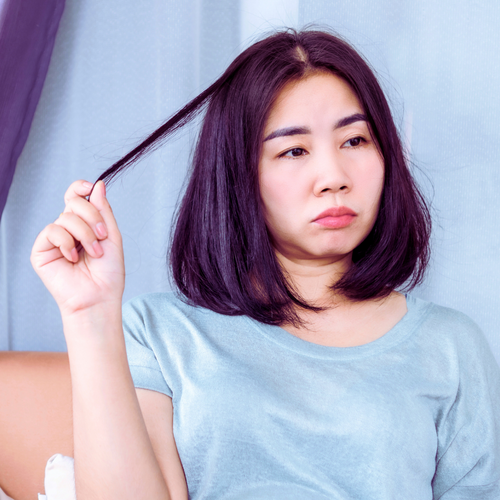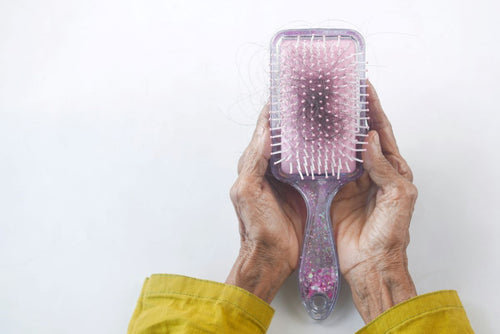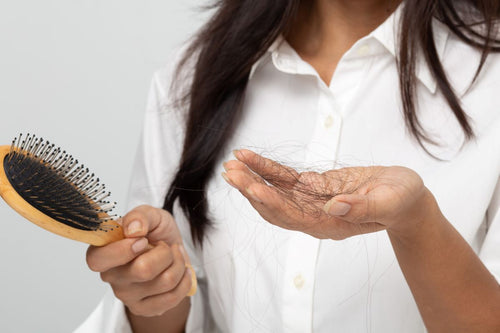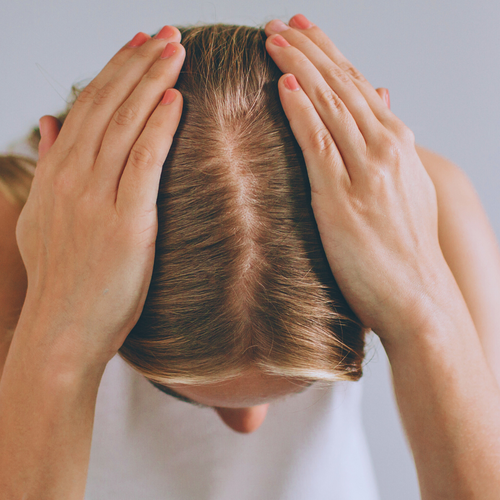Why Dry Scalp Happens During Perimenopause
As estrogen levels decline during perimenopause, many women are surprised to experience not just hot flashes and sleep changes, but also dry, itchy, and flaky scalps. This happens because estrogen helps maintain skin hydration and oil production—even on the scalp.
But there’s a second, often-overlooked culprit: stress. And it’s not just a minor player. In midlife, up to 80% of women report a significant increase in stress, whether from caregiving, work demands, or hormonal imbalance.
How Stress Affects Your Scalp (It’s More Than You Think)
Chronic stress throws your entire skin ecosystem off balance—especially the delicate skin of your scalp.
The Cortisol Connection
Stress triggers a surge in cortisol, your body’s primary stress hormone. Over time, elevated cortisol levels:
- Compromise your scalp’s barrier
- Lead to moisture loss and inflammation
The result? A scalp that’s dry, irritated, and prone to flaking—especially during hormonal transitions.
Stress Reduces Circulation to the Scalp
Stress activates your body’s “fight or flight” response, which diverts blood flow away from the skin and scalp. This means fewer nutrients and oxygen reach your hair follicles and skin cells, slowing repair and worsening dryness.
Hormonal Shifts + Stress = A Double Hit to Scalp Health
During perimenopause, your body is already producing less estrogen, which naturally reduces oil production in the scalp. Pair that with the chronic stress many women experience during this phase, and you have a perfect storm for scalp irritation.
🧠 Did you know? Studies show that stress not only disrupts skin hydration but also increases inflammation, which can worsen sensitivity and flaking.

How to Fix Dry Scalp in Perimenopause (Especially When Stress is a Factor)
Step 1 – Use a Targeted Scalp Serum with Anti-Stress Benefits
Look for a water-free, adaptogenic serum infused with:
- Antioxidants to fight oxidative stress
- Botanical oils (like rose, neroli) to moisturize and calm the scalp
- Adaptogens (like holy basil or ashwagandha) to help buffer your skin against the effects of stress
💡 Our dermatologist-formulated Revita+Fol™ serum was designed for exactly this kind of issue—restoring hydration and balance to dry, stress-affected scalps.
Step 2 – Add Scalp Massage to Your Evening Ritual
Massaging the scalp increases blood flow and promotes lymphatic drainage, helping your scalp recover from stress. Bonus: it also calms your nervous system.
Use gentle circular motions with your fingers or a silicone scalp massager. Apply serum beforehand for even more benefit.
Step 3 – Lower Stress from the Inside Out
- Try adaptogenic teas or supplements with adaptogens like holy basil or rhodiola.
- Use breathwork, yoga, or warm baths to calm your nervous system.
- Consider your nightly scalp massage your anti-stress meditation.

Build a Scalp Care Ritual That Soothes You—Not Just Your Skin
Midlife is a time to reclaim calm. Transform your scalp care into a sacred moment of stillness.
Here’s a simple 5-minute ritual:
- Brew a calming tea like lavender or chamomile.
- Warm a towel and wrap it around your shoulders.
- Massage Revita+Fol™ into your scalp with deep, grounding breaths.
- Dim the lights. Light a candle. Unplug.
Your scalp—and your stress response—will thank you.
Final Thoughts
If you’re dealing with dry scalp during perimenopause, it’s not “just aging.” It’s often the result of stress, hormone shifts, and inflammation—and it’s fixable.
You deserve skincare that works with your biology, not against it.
Frequently Asked Questions
Is dry scalp common in perimenopause?
Yes. Hormonal changes reduce sebum production, and many women experience dryness and flaking for the first time during this stage.
Can stress really affect my scalp?
Absolutely. Chronic stress increases cortisol, disrupts your scalp’s barrier, and reduces circulation—all of which contribute to dryness and inflammation.
What ingredients should I look for in a scalp serum?
Adaptogens (ashwagandha, holy basil), antioxidants, and botanical oils (rose, neroli, jojoba) are ideal for dry, stressed scalps.
How long does it take to see improvement?
Many users of Revita+Fol™ report improvement in hydration and scalp comfort in just 2–4 weeks with consistent use.






















